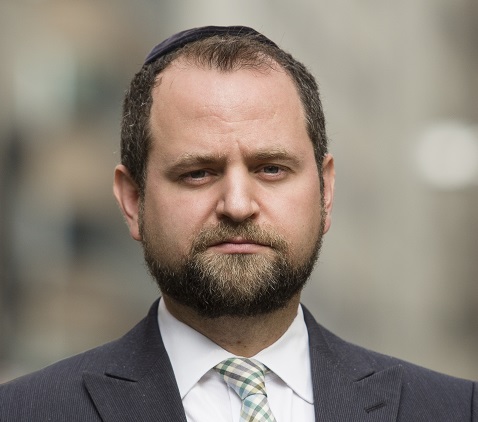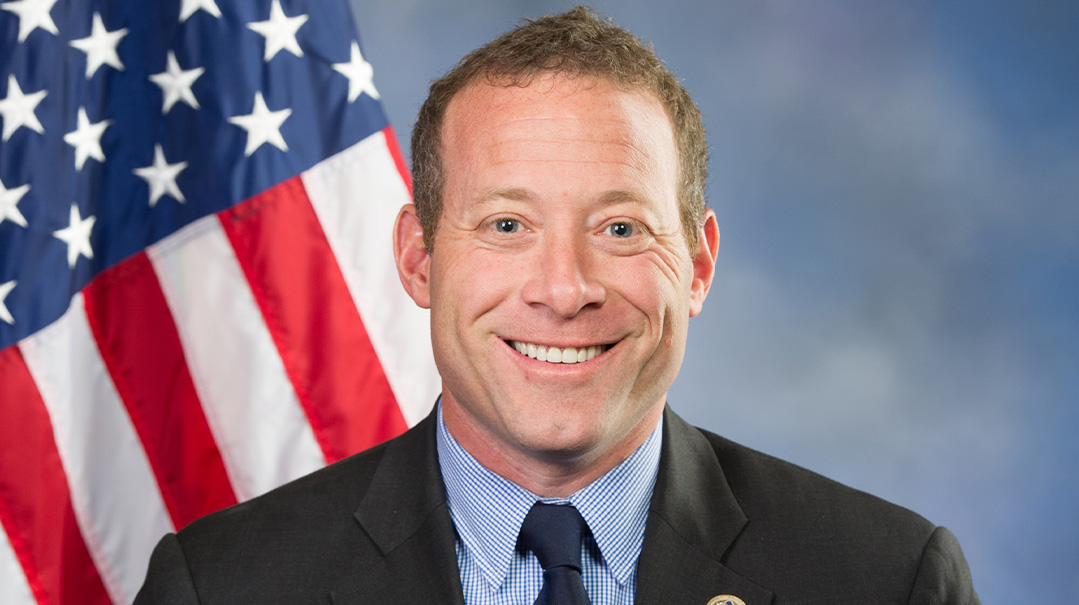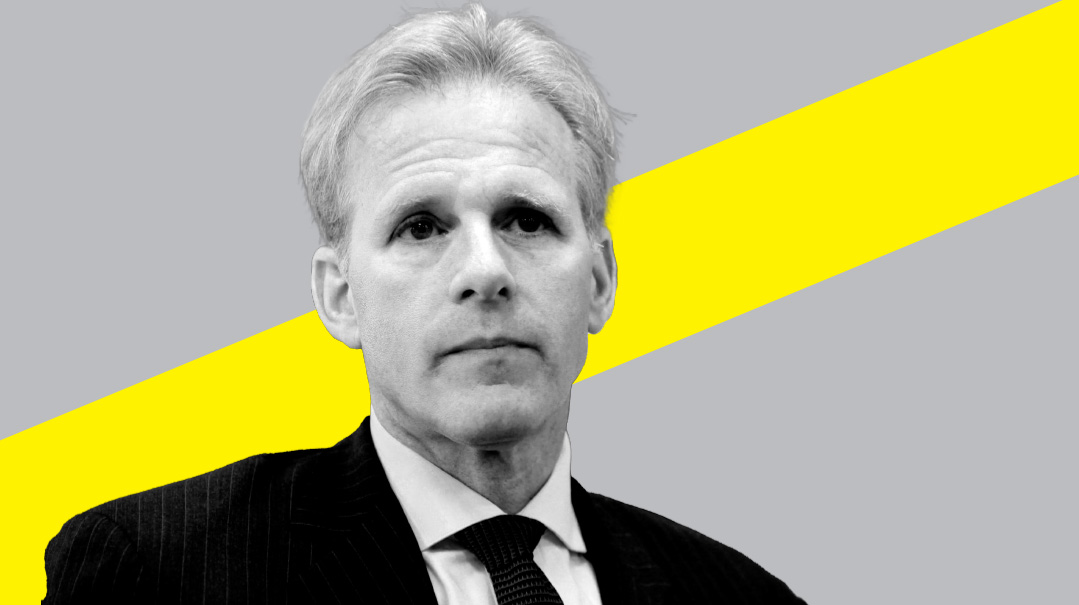A Few Minutes with… Rep. Josh Gottheimer (D-NJ): Making America Bipartisan Again


Away from the margins, says Rep. Josh Gottheimer (D-NJ), Congress is doing its job

The minute Josh Gottheimer took his Congressional oath of office in January 2017, the New Jersey Democrat began charting a bipartisan course. As co-chair of Congress’s Problem Solvers Caucus along with Brian Fitzpatrick (R-PA), Gottheimer leads a caucus of 29 Democrats and 29 Republicans who have summoned the political courage to cross party lines to pass laws of importance to all Americans, including the Covid package under President Trump and the infrastructure plan under President Biden.
Gottheimer, New Jersey’s only Jewish member of Congress, represents the Garden State’s 5th Congressional District, covering parts of Bergen, Passaic, Sussex, and Warren counties. Re-elected to a fourth term in November, he serves on the House Homeland Security Committee, where he successfully pushed for the removal of Twitter accounts affiliated with Hamas and Hezbollah; and on the House Financial Services Committee. This interview was originally conducted on our Power Politics podcast and has been abridged and lightly edited for clarity.
Watch the full interview on Episode #6 of the Power Politics Podcast
How are you solving America’s problems in a bipartisan way?
We’re actually trying to govern, and that’s been my approach since I got elected — of trying to figure out ways where we can sit down, Democrats and Republicans, break bread, develop relationships, and trust and figure out where we can get to an 80% agreement, versus insisting on 100% or nothing. It’s been incredibly successful.
The interest in the caucus has only grown every Congress. We helped negotiate the last Covid package under President Trump, and then in the last Congress, we got bipartisan legislation across the finish line for building [micro]chips in the United States of America, and then on the bipartisan infrastructure bill, which I helped write and pass. We also passed commonsense gun safety, legislation to support our veterans, and to fund — not defund — law enforcement.
We now are just finalizing our class for this Congress. There are so many people interested, which is great. But you can’t just join. You actually go through a process where you engage with the other members, talk about your commitment to governing and to civility and to working together to put the country first.
Congressman, can you walk us through a sample conversation that you might have with a Republican, to get that Republican on board?
Every conversation that I find effective starts not with me speaking, but with me listening, because around here, people spend a lot of time talking and not enough time trying to understand what’s actually important to the other side that you’re negotiating with. Often, I find — and I’ve made this mistake myself — that I’ve read something or seen something out there, and I just presume what the issue or the hang-up is for the other side.
And then when I actually sit down and have a constructive conversation, I do intensely listen. I realize — wait a second, their big issue is solvable. And that’s often how the deals get done, because we are able to get past the issues that the other side is having.
There was a terrible incident last week in New Jersey where [Temple Ner Tamid in Bloomfield] got firebombed. You were one of the elected officials on the scene there. You’ve also gone to the Rutgers campus to deal with some of the anti-Semitic incidents that happened there. What should other elected officials be doing that you’re not seeing?
You both know better than anybody about the heartrending surge of anti-Semitic attacks, not only in New Jersey, but around the country. Up a third, year over year, according to the ADL nationwide, and up 25% in New Jersey. New Jersey has the second highest number of incidents in the country, second only to New York, and these are all record numbers.
So I went to the temple last week in Bloomfield, like I often visit shuls or schools where there’s been an incident. If it’s a school, I’ll talk to the superintendent or the principal immediately. The initial reaction is often, "Let’s just make this go away. Let’s sweep it under the rug because it’s too hard to talk about, or because I don’t want people to think that this is what it’s like here, so let’s just try to make it go away as fast as possible." That’s exactly the wrong reaction.
The number one thing I always start with is: How are we using this moment to teach and to prevent this from ever occurring again? And the other thing that I’ve learned is we have to speak out about these things, and not just as Jews.
All elected officials, and all community members and leaders from all different faiths, must speak out, and I push for it very hard. Sometimes, my colleagues look at me and say, “We’re doing this again?” And frankly, my answer is, yeah. Until they stop, we’re going to keep doing it. I don’t let these things go, because we can’t afford to. I feel very strongly about that.
Congressman, unfortunately, there’s also a lot of hate and violent acts on the international level. You’ve sponsored HR 340, called the Hamas International Financing Prevention Act, and also HC Resolution 7, which condemns human rights abuses in Iran.
Hamas is already considered a terror organization. What layers of prevention do your resolutions add that we don’t have right now?
The problem with a lot of sanctions that we’ve imposed as a country is they’ve gone on for certain periods, or windows of time, then they roll off. There’s certain business you can do that’s allowed and certain business that is not allowed under these sanctions. [My] particular bill ensures anyone who does [any] business with Hamas or Palestinian Islamic Jihad is precluded from engaging and doing business [with Americans], and that helps fill a gap in the system.
And broadly speaking, I have several pieces of legislation that I’ve introduced, supporting people in Iran who stand up to their government, to protect human rights against the violations that are going on.
I have been very vocally critical of Iran since before I was elected to Congress. I was aggressive in my beliefs that the Iran [nuclear] deal, the JCPOA, was bad for the United States of America and for our national security. Obviously, it put our allies at risk. Iran, as we’ve seen in recent months, with their deepening ties to China and Russia, has proven that they are consistent liars, and [that justifies] the fears that many of us had, not just [about] their nuclear program, but frankly their terror program.
Is there anything more the US government should be doing to support regime change in Iran?
I think right now we’ve been very involved in supporting those who are standing up to the government there. I know a lot more in a classified setting that I can’t really talk about, but I believe the United States is taking a lot of the right steps on the ground.
We have new congressional leadership now on both the Republican and the Democratic sides. With new House Speaker Kevin McCarthy (R-CA) and House Minority Leader Hakeem Jeffries (D-NY), are they more favorable, would you say, than the previous leadership to the goals of the Problem Solvers Caucus? And do you think it’ll be easier or harder for you to work in this regard?
I have a good relationship with [House Minority] Leader Jeffries. I’ve especially spent a lot of time over the years talking with him about us [our caucus] and the importance there. And my co-chair of the Problems Solvers Caucus, Brian Fitzpatrick from Pennsylvania, the Republican, who’s one of my dearest friends, has a very good relationship with Speaker McCarthy. Those are good things — that we have those relationships — but both of us are not afraid to disagree when we have to.
With [previous House] Speaker [Nancy] Pelosi, we had moments where we worked together and when we legislated, and other moments where she wasn’t exactly sending me Chanukah gelt. Because my job is [that] I don’t work for a national political party. I work for the people I represent, and I believe deeply in two-party solutions, which is not always what’s aligned with our leadership. But Brian and I understand that, and the good news is we have a very good open-door relationship with our leaders.
And I don’t hide things from our leaders when we’re working on things like we are right now on the debt ceiling in a bipartisan way. I let our leadership know what we’re working on. The conversations, of course, are confidential, but I will let them know what we’re doing.
I’m sure you hear from a lot of people who just roll their eyes and say, “Yeah, sure. You’re trying to be bipartisan? Good luck to you.” There just seems to be this overarching cynicism and pessimism. What inspiration can you give us before we leave?
Let’s just say that not everyone is having as constructive of a conversation as Mishpacha is. You’re asking substantive questions and having a real discussion here about issues. The unfortunate reality is that if you watch cable news, or watch or read social media, it’s all driven by trying to get clicks. And even a lot of our news is so driven now by just getting that two-second engagement and making money. [What people see there are] the bomb throwers. The extremists who spend all their time screaming and yelling and attacking each other. And it’s better programming on cable news, right?
They may not all have the time to listen to this full conversation, so they just say, “Oh, these guys are like clowns. All they do is fight.” They focus on, like, the Marjorie Taylor Greenes and the AOCs, right? The Freedom Caucus and the Squad. That’s what they see, and all they see are the extreme positions. And then there’s [the rest] of us here that are governing and getting it done and passing the infrastructure bill to help fix the roads, bridges, and tunnels in New Jersey, and our water infrastructure, and broadband, and the things they experience day to day.
When I tell people that, and they’re like, “Really, that’s happening?” They can’t believe it. “Why don’t you get more attention?” I say, because no one goes down to the Washington Monument or the Lincoln Memorial with a sign that says, “Work together, get it done!” That’s just not what people show up to Washington about. It shouldn’t be that way. But that is just the reality that we’re living in.
But I’ll tell you right now, I’m not going to stop doing my job, fighting for the people I represent and the issues I represent, whether it’s supporting the US-Israel relationship, which is key to our national security, whether it’s fighting anti-Semitism, investing in our infrastructure, supporting cops. I’m not going to back off, even if it gets less attention, because I didn’t come here to just scream and yell and get nothing done. What’s the point of doing that?
(Originally featured in Mishpacha, Issue 948)
Oops! We could not locate your form.







